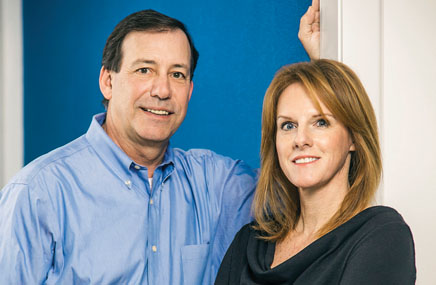Renavatio Healthcare Communications
Routinely, it’s wise to wait until the sixth or seventh year of a fledgling agency’s existence before deciding to anoint it a success. Nonetheless, if any firm can make a case for cutting a few years off of that initial prove-yourself period, that firm would likely be Renavatio Healthcare Communications. Only a few months past its third birthday, the agency has delivered on a well-defined proposition: specialty pharma, medical-device and biotech brands only, serviced by lean teams of experienced marketing pros.
Renavatio’s first three years of operation have seen the agency’s revenue grow in the 30–35% range annually—though admittedly it’s growth from a small initial base—and a quick surge to 35 full-time staffers. “The specialty side of the industry is the place to be,” says Renavatio’s principal and brand strategist Larry Iaquinto. “The days of primary care blockbuster drugs are over.”
Iaquinto, who in a past professional life headed Interlink Healthcare Communications for 12 years, believes that the role of the healthcare marketing agency must evolve in response to the aforementioned industry changes. To that end, he and fellow principal/brand strategist Sheila Gerus have staffed and aligned Renavatio to make sure that the agency stays ahead of the curve. “As we march towards personalized medicine, agencies need to be leaner, smarter and more precise than agencies in the past. We tried to create Renavatio within that context, of what the new model will be for the companies who make those products,” he says.

The specialty space isn’t without its challenges, of course. Manufacturers of medical and diagnostic devices and drugs for obscure conditions generally are operating with considerably tighter budgets than Big Pharma has at its disposal. Also, in many cases, the Food and Drug Administration hasn’t yet weighed in on such products and/or categories, a state of affairs that can make dealing with the regulatory process even more daunting.
By way of example, Iaquinto points to the work Renavatio has been doing on behalf of Osiris Therapeutics, which is producing stem-cell products for injury repair. “The FDA has never looked at that,” he says. “It’s a lot trickier than launching a drug like Lipitor, where you can mess up a few times and still make a million dollars.”
Renavatio is well aware that it lacks that kind of margin for error. And because of that need to get things done quickly and precisely, the agency only hires senior-level people to work for it. “They have more wisdom. They get things done smarter, faster and more precise, and within clients’ budgets. When you hire Renavatio, you’re not paying us to have ten people touch your brand,” Iaquinto stresses.
On the new-business front, the agency won a five-agency derby for Meda Pharmaceuticals’ allergy drug Dymista, and leveraged its work on the account into a handful of assignments from Meda, including AOR status for erectile-dysfunction drug Muse. It also scored the launch assignment for Abbott Point of Care’s i-STAT System (a handheld blood analyzer) as well as being awarded the relaunch gig for an Ipsen growth hormone.
As opposed to client migrations or having one of its products go generic, the key challenge that Renavatio has faced in recent months falls under the good-problem-to-have banner: managing growth. The agency added office space to accommodate the increasing number of bodies, and plans an awareness campaign of sorts to spark further industry interest in its offerings.
“We’re going to become more public as an organization,” Iaquinto promises. “In our first three years, we’ve really only worked with people who we’ve wanted to work with or had worked with us in the past. Now, we’re going to try to attract, in a more public way, specialty pharma. We’ll target specific products that fit well into our model.”
From the July 01, 2012 Issue of MM+M - Medical Marketing and Media








